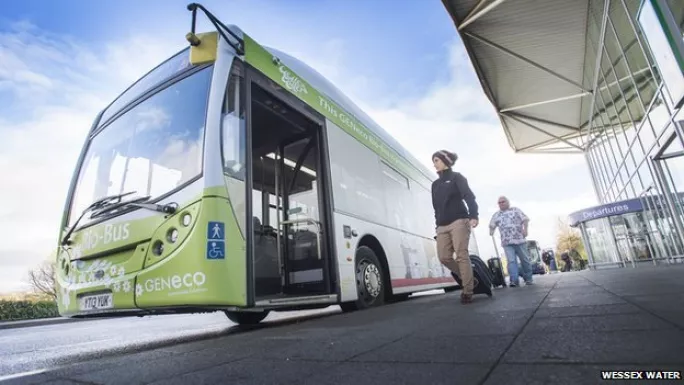Bus powered by human waste drops its first load
This week, the first British bus to be powered entirely by human waste - dubbed “the poo bus” - has taken to the streets.
What’s all the fuss about?
The 40-seater Bio-Bus is fuelled by biomethane gas, generated by the treatment of sewage, as well as food deemed unsuitable for human consumption. A single tank of the gas, which is produced from the typical annual waste of five people, is enough to power the vehicle for 186 miles.
On Thursday this week, the bus - already being referred to as “the number two” - made its maiden voyage, picking up passengers at Bristol Airport and dropping its load in the nearby city of Bath.
How does it work?
The gas is being produced at a plant run by energy firm GENeco. The waste plant in Bristol annually treats 75 million cubic metres of sewage waste and 35,000 tonnes of food waste. Using a process known as anaerobic digestion, the plant uses bacteria to break down biodegradable matter to produce methane-rich biogas. The plant is able to produce 17 million tonnes of biomethane a year.
To power the bus, the biogas undergoes an additional process to remove carbon dioxide and add propane. While the bus may be powered from the rear, its fuel is in fact stored in tanks on the roof.
A single passenger’s annual food and sewage waste would fuel the bus for 37 miles. But the annual waste generated by one busload of 40 passengers would provide enough power for a trip from Land’s End to John O’Groats.
Impurities are removed from the gas during processing, to ensure that the journey is, if not fragrant, at least odourless. Straining to prove this point, Mohammed Saddiq, general manager of GENeco, said that gas-powered vehicles would play an important role in improving air quality in British cities.
Is this the start of a new movement?
Human waste is, for obvious reasons, a renewable fuel. Eco-campaigners have called for sewage and food waste to be collected and recycled into green gas and biofertilisers, rather than thrown into landfill sites.
A spokesman from Bath Bus Company said that, with so much attention being directed towards improving air quality at the moment, “the appearance of this bus will further focus on the potential of this particular fuel”.
And, in fact, GENeco this week became the first company to start delivering gas generated from human waste to 8,300 homes, via the national grid. But, Mr Saddiq added, the Bio-Bus goes further than that and “is actually powered by people living in the local area, including quite possibly those on the bus itself”.
Questions for debate and discussion
- How could the bio-bus impact on our environment?
- How important is it to have an eco-friendly attitude in society today?
- What other machinery or vehicles could we use public waste to fuel?
- What is the difference between renewable and non-renewable fuel? Can you think of some examples of each type?
Related resources from TES
How can we look after the environment?
Encourage students to think about how they can have a positive effect on the environment with this lesson.
Human impact on the environment
Use this PowerPoint presentation to stimulate thought and discussion about human impact on the environment.
These lessons will help students to develop an understanding of recycling and sustainability.
Based on the rules of Monopoly, this fun game will remind students of the different energy sources available and their uses.
Keep reading for just £1 per month
You've reached your limit of free articles this month. Subscribe for £1 per month for three months and get:
- Unlimited access to all Tes magazine content
- Exclusive subscriber-only stories
- Award-winning email newsletters




